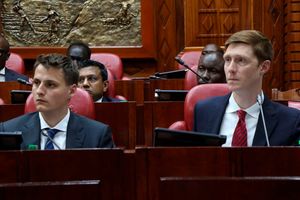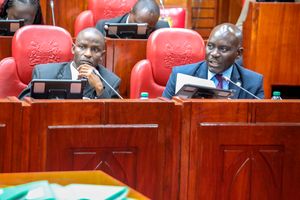
Mercelyne Nanjala Muliro scans her iris to create personal, secure identification codes as part of requirement while registering as a member of the new Worldcoin cryptocurrency at KICC Nairobi on August 1, 2023.
Global cryptocurrency project Worldcoin has suffered a setback after the High Court in Nairobi ordered the deletion of biometric data collected from Kenyans two years ago, in a judgment that entrenches the country's laws on the right to privacy.
Justice Roseline Aburili also prohibited Worldcoin from processing or transferring the data, including iris and facial scans, gathered from Kenyans in 2023.
The judge found that Tools for Humanity, the parent company for Worldcoin, illegally collected biometric data using incentives and violated various laws. She said it failed to conduct a data protection impact assessment, failed to register as data processors and improperly induced consent from Kenyans.
“There is no evidence they complied with data collection requirements. They committed a gravity of violations and breached the Constitutional right on privacy. They required a typed approval of the Orb device material to be used in data collection,” Justice Aburili said.

A man is helped scan his iris to create identification codes as part of the requirement while registering as a member of the new Worldcoin cryptocurrency at KICC Nairobi on August 1, 2023.
The judge ordered Worldcoin to delete, under the supervision of the Office of the Data Protection Commissioner (ODPC), the biometric data collected.
The verdict followed a petition filed by Katiba Institute and International Commission of Jurists (ICJ Kenya) claiming that the Worldcoin was rolled out in Kenya irregularly and that it was signing up Kenyans without obtaining their informed consent.
Through lawyers Ochiel Dudley, Demas Kiprono and Malidzo Nyawa, the lobbies argued that no proper due diligence was done by ODPC before issuing Worldcoin with a certificate of registration on September 16, 2022.
They added that Worldcoin entered the Kenyan market by offering cryptocurrency valued at approximately $55 in exchange for users’ biometric data.

Kenyans queue at KICC Nairobi on August 1, 2023 to register for the Worldcoin cryptocurrency.
Their lawsuit also sought an order for the development of clear guidelines for the commercial use of personal data in Kenya and stronger regulatory oversight and enforcement of data protection laws. However, the judge declined to issue the order.
“The ICJ Kenya welcomes today’s landmark judgment by Justice Aburili declaring the collection, processing, and transfer of biometric data (iris scans) by Tools for Humanity, which owns Worldcoin, as unlawful and unconstitutional.
“The judgment rightly underscores that even in the digital age, constitutional rights, especially the right to privacy under Article 31 of the Constitution, must be upheld,” said Mr Protas Saende, ICJ Kenya chairperson.
“This ruling is a powerful precedent not just for Kenya, but globally, affirming that rights must remain paramount in technological innovation,” he added.

Kenyans queue at KICC Nairobi on August 1, 2023, to register for the Worldcoin cryptocurrency.
In its defence, Worldcoin, through Mr Thomas Scott, the Chief Legal Officer and Corporate Secretary of Tools for Humanity and its marketing associate Sense Marketing, denied the legal breaches and argued that people who signed up were properly informed.
Mr Scott said Worldcoin aimed to establish universal access to the global economy regardless of country or background and was building the world’s largest identity and financial network and giving ownership to everyone.
The Data Commissioner said Worldcoin did not make full disclosures, in contravention of the Data Protection Act and the Data Protection (Registration of Data Controllers and Data Processors) Regulations 2021. After investigations, the commissioner established that the processing of data neither met the requirements of the Data Protection Act nor had the organisations provided a lawful basis for such processing.









